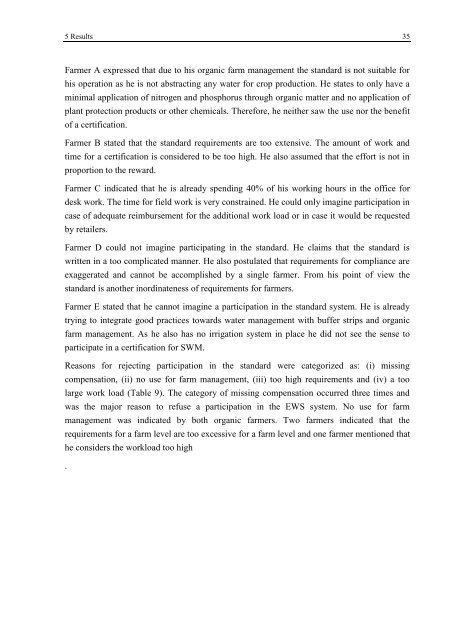Assessing the European Water Stewardship Standard in the Context ...
Assessing the European Water Stewardship Standard in the Context ...
Assessing the European Water Stewardship Standard in the Context ...
You also want an ePaper? Increase the reach of your titles
YUMPU automatically turns print PDFs into web optimized ePapers that Google loves.
5 Results 35<br />
Farmer A expressed that due to his organic farm management <strong>the</strong> standard is not suitable for<br />
his operation as he is not abstract<strong>in</strong>g any water for crop production. He states to only have a<br />
m<strong>in</strong>imal application of nitrogen and phosphorus through organic matter and no application of<br />
plant protection products or o<strong>the</strong>r chemicals. Therefore, he nei<strong>the</strong>r saw <strong>the</strong> use nor <strong>the</strong> benefit<br />
of a certification.<br />
Farmer B stated that <strong>the</strong> standard requirements are too extensive. The amount of work and<br />
time for a certification is considered to be too high. He also assumed that <strong>the</strong> effort is not <strong>in</strong><br />
proportion to <strong>the</strong> reward.<br />
Farmer C <strong>in</strong>dicated that he is already spend<strong>in</strong>g 40% of his work<strong>in</strong>g hours <strong>in</strong> <strong>the</strong> office for<br />
desk work. The time for field work is very constra<strong>in</strong>ed. He could only imag<strong>in</strong>e participation <strong>in</strong><br />
case of adequate reimbursement for <strong>the</strong> additional work load or <strong>in</strong> case it would be requested<br />
by retailers.<br />
Farmer D could not imag<strong>in</strong>e participat<strong>in</strong>g <strong>in</strong> <strong>the</strong> standard. He claims that <strong>the</strong> standard is<br />
written <strong>in</strong> a too complicated manner. He also postulated that requirements for compliance are<br />
exaggerated and cannot be accomplished by a s<strong>in</strong>gle farmer. From his po<strong>in</strong>t of view <strong>the</strong><br />
standard is ano<strong>the</strong>r <strong>in</strong>ord<strong>in</strong>ateness of requirements for farmers.<br />
Farmer E stated that he cannot imag<strong>in</strong>e a participation <strong>in</strong> <strong>the</strong> standard system. He is already<br />
try<strong>in</strong>g to <strong>in</strong>tegrate good practices towards water management with buffer strips and organic<br />
farm management. As he also has no irrigation system <strong>in</strong> place he did not see <strong>the</strong> sense to<br />
participate <strong>in</strong> a certification for SWM.<br />
Reasons for reject<strong>in</strong>g participation <strong>in</strong> <strong>the</strong> standard were categorized as: (i) miss<strong>in</strong>g<br />
compensation, (ii) no use for farm management, (iii) too high requirements and (iv) a too<br />
large work load (Table 9). The category of miss<strong>in</strong>g compensation occurred three times and<br />
was <strong>the</strong> major reason to refuse a participation <strong>in</strong> <strong>the</strong> EWS system. No use for farm<br />
management was <strong>in</strong>dicated by both organic farmers. Two farmers <strong>in</strong>dicated that <strong>the</strong><br />
requirements for a farm level are too excessive for a farm level and one farmer mentioned that<br />
he considers <strong>the</strong> workload too high<br />
.


